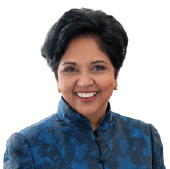Self-Awareness: A Key to Better Leadership
Self-awareness is crucial for evolving and finding coping strategies for weaknesses. An excerpt from “How To Become a Better Leader.” Image: PepsiCo CEO Indra Nooyi.
Topics

PepsiCo CEO Indra Nooyi has said that she benefited from feedback from mentors.
Image courtesy of PepsiCo.
How can leaders recognize and manage their psychological preferences?
In a wide-ranging article for the Spring 2012 issue of MIT Sloan Management Review, authors Ginka Toegel, a professor of organizational behavior and leadership at IMD in Lausanne, Switzerland, and Jean-Louis Barsoux, a professor of organizational behavior and leadership at IMD, lay out findings from more than 2,000 in-depth conversations with international executives.
In this excerpt from How To Become a Better Leader, the authors examine the role of self-awareness, which they deem crucial for evolving and finding coping strategies for weaknesses:
A survey of 75 members of the Stanford Graduate School of Business Advisory Council rated self-awareness as the most important capability for leaders to develop. Executives need to know where their natural inclinations lie in order to boost them or compensate for them. Self-awareness is about identifying personal idiosyncrasies — the characteristics that executives take to be the norm but actually represent the exception.
Sometimes self-awareness comes early in one’s career, prompted by a comment from a trusted colleague or boss. In an article in Fortune International, Lauren Zalaznick, now chairman, Entertainment & Digital Networks and Integrated Media for NBC-Universal, recalled that the best advice she ever received was from her first boss, who told her: “Throughout your career, you’re going to hear lots of feedback from show-makers and peers and employees and bosses. If you hear a certain piece of feedback consistently and you don’t agree with it, it doesn’t matter what you think. Truth is, you’re being perceived that way.”
On her rise to the top, PepsiCo CEO Indra Nooyi has also benefited from constructive feedback: “I’m a pretty honest and outspoken person,” she told the Wall Street Journal Europe. “So, you sit in a meeting and somebody presents a … five-year plan. [Other executives] would say, ‘You know, that’s very interesting. But maybe you could think about this slightly differently.’ I just said, ‘That’s crap. This is never going to happen.’ I’m sure they were all thinking that, but they were saying it in a much more gentle way. I’d come out of the meeting, and one of the guys would pull me aside and say, ‘You could have said the thing slightly differently.�

Comments (5)
pawan singh
Cynthia G. Peacock
iobm11
pshah
akira